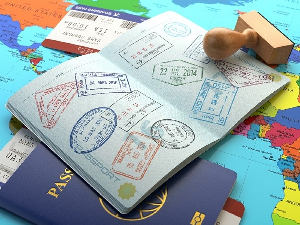- Home - News
- TWI News | TV
- Polls
- Year In Review
- News Archive
- Crime & Punishment
- Politics
- Regional
- Editorial
- Health
- Ghanaians Abroad
- Tabloid
- Africa
- Religion
- Election 2020
- Coronavirus
- News Videos | TV
- Photo Archives
- News Headlines
- Press Release
General News of Wednesday, 26 November 2003
Source: GNA
Insulate internal auditors against management- MPs
Parliament on Wednesday unanimously adopted the report of the Parliamentary Finance Committee on the Central Internal Audit Agency Bill (CIAAB), with a call on the government to institute legal protection for internal auditors in the Ministries Departments and Agencies (MDAs).
The bill, when passed into law, will establish a Central Internal Audit Agency (CIAA) to, among other things, coordinate, facilitate and provide quality assurance for internal audit activities in the MDAs and the Metropolitan, Municipal and Districts Assemblies (MMDAs).
It will also establish a board for the CIAA to operate as an apex oversight body and as well set standards and procedures for the conduct of internal audit activities in the MDAs and MMDAs, hitherto done by staff from the Controller and Accountant-General's Department (CAGD) delegated to these organisations. Dr. Anthony Akoto Osei, Deputy Minister of Finance and Economic Planning in charge of budget, moved the motion for second reading of the CIAA bill, seconded by the Finance Committee Chairman Mr. Eugene Atta Agyepong.
Dr Akoto Osei said under the current dispensation, internal audit services in the MDAs and the MMDAs was provided by the CAGD, adding that is was currently a deficiency in human capacity at the CAGD to continue offering that delegated service.
"It is in this light that we think the bill will service a good purpose of establishing the CIAA to provide internal audit services on a more regular proactive basis to ensure that our national resources are judiciously applied and properly accounted for."
Mr. Atta-Agyepong said in the current dispensation, internal audit is only done as a post-mortem activity, in that internal auditors only do their work after harm had been done but under the CIAA it will be a preventive process that will check fraud.
Mr. Felix Owusu-Agyepong, the Majority Leader and Minister of Parliamentary Affairs, said "when passed into law, he bill will curb, to a large extent, what has come to be known as causing financial loss to the state."
Mr Samuel Bour-Karikari, NPP-Amansea-West said, the bill will help solve the problem of ghost names on the pay rolls of MDAs and MMDAs.
Mr. Steve Akorlie, NDC-Ho East said under the current dispensation, internal audit was only done on a holistic manner, which causes delays in the presentation of audit reports to parliament.
He said the 2000 audit report is still being reviewed, making the country three years late in gathering audit report.
"This new law will make auditing a regular and sector activity and make reports quickly available for review," he said.
Mr Abuga Pele, NDC-Chiana/Paga, said for the CIAA to play its role effectively the bill must have a provision that sufficiently insulates internal auditors from their bosses to ensure that they operate without fear or favour.
He said internal auditors are part of management of their organisation, they report to management and there is the tendency for them to compromise.
Mr Joseph Arthur, NDC-Mfantseman West, said there was the need to attach seriousness to the appointment of internal auditors, if the whole purpose of establishing the CIAA is to serve any purpose.
He said in appointing accountants for MDAs care must be taken to appoint highly qualified persons but internal auditors are usually simple accounts clerks.
Mr Arthur suggested that there should be a professional accountant from the Institute of Chartered Accountants on the Board of the CIAA.
Mr Alban Bagbin, Minority Leader and Mr. Doe Adjaho, NDC- Avenor raised questions about the constitutionality, adequacy and location of the bill and the CIAA it seeks to establish.
Mr. Adjaho said Article 187 (2) of the 1992 constitution vests the functions of internal and external audit in the MDAs and MMDAs in the Controller and Accountant General's Department.
''The passage of the bill into law could therefore violate the constitution which is the final law of the land.''
Mr Bagbin said the bill is not adequate because it did not state the defects of the present internal audit system, neither did it state any proposals for correcting such defects if any.
He also raised a question about the location of the CIAA, saying since the CAGD is under the Ministry of Finance, if the CIAA were also placed under the same ministry there would be conflict.
"It is important the CIAA has power above the CAGD since the former would be auditing the latter as well," he said. "On that score I would like to suggest that the CIAA is placed in the office of the President."
The House unanimously adopted the report of the Committee on Constitutional, Legal and Parliamentary Affairs (CCLPA) on the Industrial and Designs Bill.
Moving the motion for the second reading of the bill, Papa Owusu Ankomah, the Attorney-General and Minister of Justice, said the purpose of the bill was to enhance the operation of the laws on the protection of industrial designs.
He said the definition of industrial design includes everything in the appearance of a product, causes an aesthetic impression, in other words, anything which gives an impression received by the sense of sight can be an industrial design.
"In the course of this, the existence legislation on textile design have also been revised and incorporated into this bill," he said.
Seconding the motion, Mr. Kwame Osei-Prempeh Chairman of the CCLPA, said the bill is intended to enhance the operations of the laws that protect industrial designs.
He said Ghana used to apply the United Kingdom Designs Protection Ordinance (CAP182) and the Textiles Designs Registration Decree 1973 (NRCD. 213).
"By this bill, Ghana's law on industrial design is being broadened to cater for acceptable international provisions under the Trade-Related Aspects of Intellectual Property Rights (TRIPS) Agreement" he said.
Alhaji Muhammad Mumuni NDC-Kumbugu urged his colleagues to support the bill saying that it would protect the ownership of industrial design and ensure that people benefit from their endeavours.










